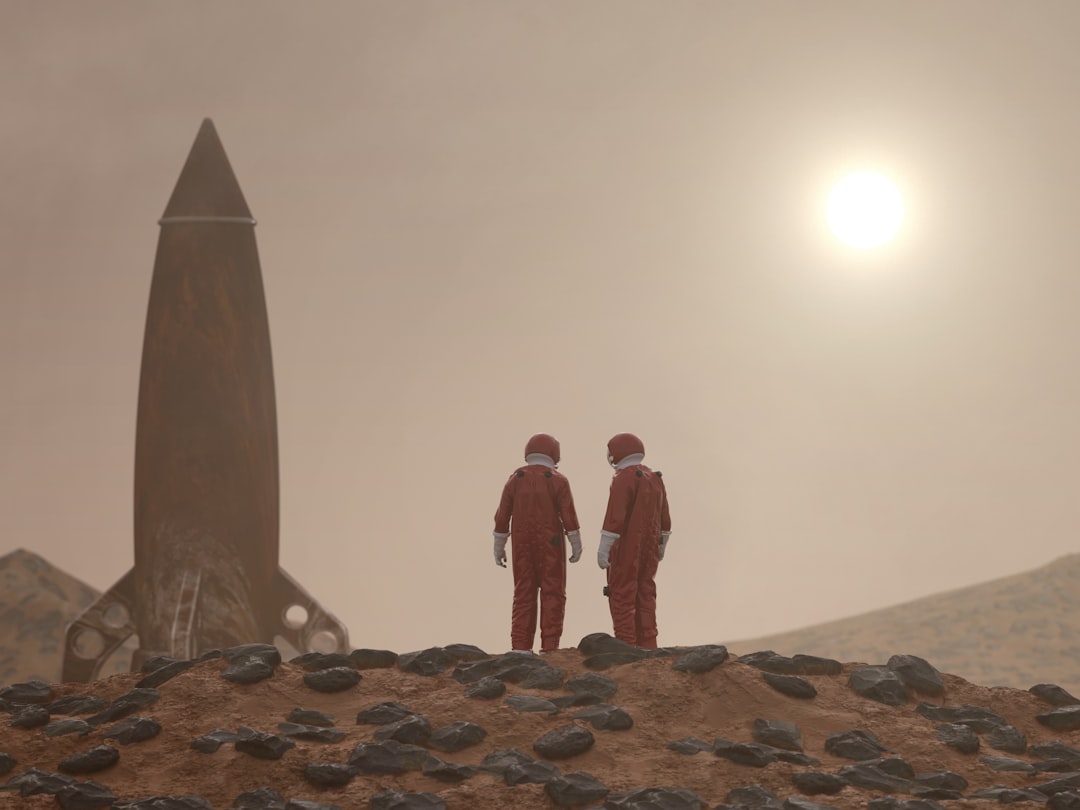Utilizing Cosmic Expansion: Innovative Solutions to Earth's Challenges
Space exploration: the unexpected solution to Earth's political, economic, and ecological crises. Dive into the 'Space Expansion Era' for more!
New Look! We're excited to introduce the new look of Space Ambition, symbolized in our brand new logo, as we continue our mission to unravel the potentials of space innovation.
Issue No 45. Subscribers 7104. Author Anthony Rain. He holds a Ph.D. in Political Science and possesses a keen interest in Data Science. As a Futurologist, he is currently concentrating his research on examining social system models by drawing parallels with machine learning models, neural networks, and artificial intelligence.

In our previous article, we discussed that space expansion is inevitable for humanity and looked at historical aspects of previous colonization eras. Today, we’ll cover the topics of military vs. industrial and civil drivers for space expansion, and potential applications of space technologies to solve problems on Earth. We will talk about the cost of the Mars mission compared to other global spending and the timing of mass Mars colonization. We will also discuss the portrait of colonists. We hope the article will inspire you!
Trade, Not War: The Unexpected Drivers of Space Colonization and Interplanetary Prosperity
When discussing space exploration and colonization of celestial bodies you can often hear an opinion that the military will be one of the main drivers. Some even claim that wars contribute to scientific and technological development. For example, here is the list of inventions during World War II. However, an equal, if not greater, effect is achieved through the expansion to new territories and solving new challenges.

Expansion and migration can certainly cause military actions like in the case of colonizing North and South America, but this is not a general rule. War is only relevant in cases when a territory is already occupied and there is no goodwill for a treaty. Good examples of peaceful political and economic expansion happened during the purchase of Louisiana (1803) and Alaska (1867) by the United States. Another important achievement of humanity is the agreements on special conditions and legal status of Antarctica and outer space. In the case of expansion to other celestial bodies of the Solar System, in the absence of any other forms of life, the only enemies human civilization faces are extreme natural conditions.
As colonies on other celestial bodies grow the reasons for potential conflicts will arise. One of the drivers for peaceful cohabitation is trade, which improves goods and information exchange between countries and increases the efficiency of national economies. For example, given the distance between the Earth and Mars, information and technology exchange from day one that will spur welfare growth, and developed trade in the future we believe there is a way for prosperous development for both planets. Who knows maybe the Martian constitution will even have a clause granting the colony independence after reaching a certain level of return on investments.

Of course, at some point, colonies will have their own Ministry of Defense and Law enforcement. They could also be a sandbox for testing new military or potentially dangerous technologies like nuclear propulsion systems, etc. It will also be useful for terrestrial defense, and as a training ground for future space pilots, and officers of ground and military space forces. We believe however that the main drivers for colonization of the Solar system will be industrial and civil applications.
Mars mission cost in perspective: 10% of the annual military budget
According to the Stockholm International Peace Research Institute (SIPRI), annual military expenditures reached in 2022 a new record of $2.2 trillion (3.7% growth, +$80 bln.). Although it sounds terrifying it’s just 2% of the global GDP. In contrast, the approximate cost of the first Mars mission in 2035 will be $230 bln. The second and subsequent missions, launched at three-year intervals, will cost approximately $142 bln. each (in prices of 2015). So global annual military spending in 2022 would be sufficient to send 14 missions to Mars. The calculations don’t account for SpaceX's Starship which will decrease the price for the missions. Thanks to the law on increasing returns the costs of production go down at scale, so as time goes missions become cheaper. Investments will also be made disproportionally over time. For example, out of a $1B investment to Mars rovers 19-year spendings $744 mln were invested in the first 4 years of development and launch, while the subsequent maintenance over 15 years amounted to only $335.8 mln.

According to Morgan Stanley, the total global space economy will reach $1 trillion by 2040. It’s big enough for Mars missions, but still insufficient for full-scale space expansion. To reach the inflection point Mars ticket price should drop significantly so that many people can afford it. With flight costs for Starship ranging from $100,000 to $500,000 per passenger and the average salary in the US for 2023 of $53,490 and the average annual income worldwide of $9,733 only a tiny fraction of the population can afford it. Of course, the settlers will sell their assets and can get loans or sign income-sharing agreements to purchase one-way tickets.
Space expansion as an effective solution for problems on Earth
During space expansion and colonization of the Red Planet humanity will face challenges that will lead to innovation and the development of new technologies and possibilities. The space industry traditionally generates inventions no less significant than the military sector. A year ago the team of Space Ambition organized a brainstorm of ideas for commercial use of the Moon. Participants generated 100+ ideas aside from obvious military ones and mining helium 3 for nuclear fusion. Although it’s hard to imagine now all sectors which will be influenced by the new era of Space expansion, we'd like to indicate several ideas.

Ecology and sustainability. We live in an era of energy transition when there is no silver bullet to solve the global energy and sustainability problem. Given that industry consumes 75% of coal, 38% of gas, and 41% of electricity, moving part of mining, manufacturing, and energy production to space will help humanity to meet sustainability goals in the future. We believe however that the effect from space expansion and associated technology progress will have a more profound positive impact on the ecology of Earth (check out our articles on greenhouse gas monitoring and agriculture).
Creating high-quality jobs. In the early stages of colonization, each colonist will create hundreds or even thousands of jobs on Earth. In 2021, NASA has supported 340k employees with 94k people working on Moon and Mars exploration projects. As the sector grows and involves more public and private companies from various industries the number of jobs will also significantly grow.
Ending shortage of resources. As we discussed in our article, mining celestial bodies and especially the asteroid belt will give humanity access to ample resources including rare earth elements.
International cooperation and collaboration. We believe that such ambitious projects like the Mars missions and the subsequent expansion of humanity across the Solar system are possible only thanks to international collaboration. The International Space Station is a good example of such an endeavor. The more cooperation between countries the lower the risk of conflict between them.
Social progress. One of the growth drivers for any country's economy is population growth. It could be achieved both by birth rate growth and immigration. But by the mid-21st century due to the demographic transition - most countries on Earth will face a population decline. Expansion across the Solar system can potentially get demographic growth back on track; since immigration alone can’t drive the population growth of the colonies to occupy the vast empty spaces of the new worlds.
A new philosophy and ideology. Numerous authors and movie makers have already given us a myriad of science fiction books and movies that inspired the new wave of engineers and scientists. We believe that the new Renaissance in arts and philosophy will happen during the space expansion era. It will also foster a paradigm shift from the concept of conspicuous consumption to rational consumption which is crucially important to meet ESG goals.

Portrait of a Colonist - The Individual of the New Era
The first settlers will be scientists and engineers. They will be followed by explorers, passionate individuals, dreamers, adventurers, and those who want to start over. They will crave freedom and self-expression. They will face extreme challenges living under a dome with limited space and resources. They will also face the inevitable risks and tragedies. All that will leave scars and impact the social behavior and norms of the colonists. Many professions will be irrelevant in the early stages. Colonies will primarily need scientists, engineers, experts in robotics, mining, energy, air, water, and food. They will be followed by specialists in medicine, agriculture, education, and service.
Martian society will significantly differ from traditional societies on Earth, but at the same time, it will resemble the pioneers of the North American colonies, the ambitious military merchants of the Great Age of Discovery, the founders of the modern state of Israel, as well as the meritocratic state of Singapore. There is a great chance that Martian society will be peaceful since they will fight only against Martian nature.

Martian citizens will inherit from North American pioneers a thirst for freedom and better living conditions, liberation from previous social problems, and the legacy of the past. They will have high solidarity and trust in each other, shared ideas, and an understanding that they have found their home, hard work, and respect for labor like the citizens of modern Israel. They will also have a sense that political and economic power is evidence of society's trust in managerial talent and abilities, a commitment to effective governance, and fairness in conditions of limited resources like Singaporeans.
We believe the colonists of Mars and other celestial bodies will be ambitious and creative individuals ready for collaboration and uniting efforts to create a shared future. They will embrace cultural diversity as the foundation of development and good traditions supporting stable progressive social progress. Such space ambitions and their future society inspire us to bring it to life! If you have any ideas, please, don’t hesitate to share them with us via hello@spaceambition.org or in the comment section below.




"But by the mid-21st century due to the demographic transition - most countries on Earth will face a population decline. Expansion across the Solar system can potentially get demographic growth back on track; since immigration alone can’t drive the population growth of the colonies to occupy the vast empty spaces of the new worlds."
I don't see how people leaving Earth will help the local population problem. Also, while I agree with the need to explore space, I don't think anything we do in space will fundamentally alter the trajectory of Earth's fertility rates. There are deep structural causes for lower fertility, including high housing, healthcare, education, and childcare costs that are deterring many from having children.